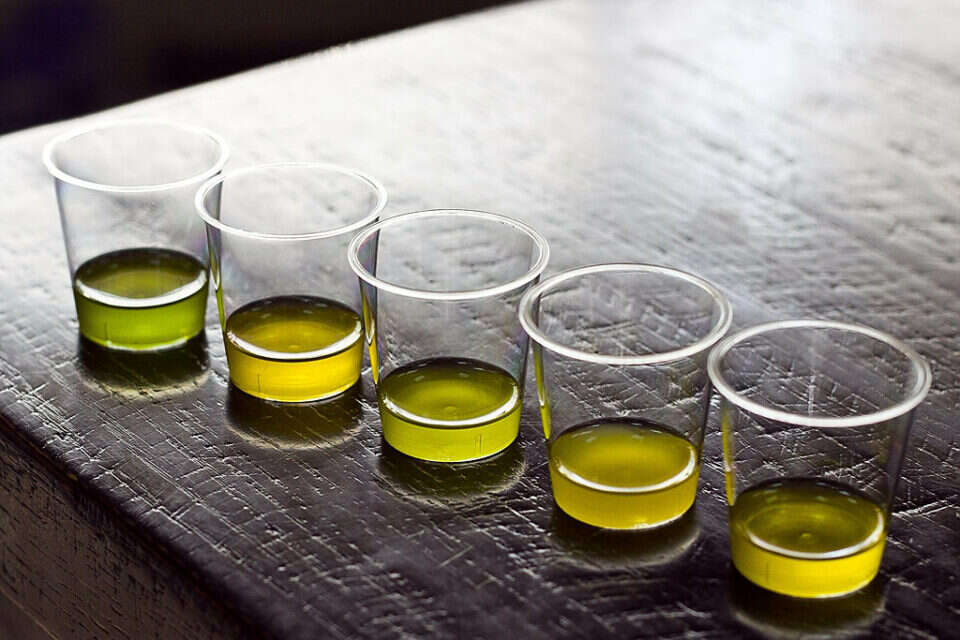At a supermarket in Jerusalem, Ohad David pulls the most expensive olive oil from the shelf in the store.
He collects three bottles of the "Midnight Cortina" brand, which cost about 165 NIS per 500 ml. Create olive oil.
Dozens of discounts and promotions on Hanukkah attractions!
But David, a 40-year-old insurance agent and father of five, did not buy the oil because of its fine taste.
Like thousands of ultra-Orthodox consumers who buy premium olive oil before Hanukkah, the olive oil he purchased for NIS 495 is intended to be used as a fuel in the menorah.
The use of olive oil instead of wax candles in the menorah has become more common in recent years among observant people, in order to remain faithful to the source of the story of the miracle of the jug of oil, which as far as is known was oil made from olives.
Menorah lit with olive oil, Photo: Dana Friedlander, Israel's Ministry of Tourism
"Halacha does not require the use of olive oil instead of candles in the menorah, but in our community this is the practice," David explained.
Those who do so seek only pure olive oil, which is priced in the land of the Emir due to import caps and the growing demand.
As demand increased, so did the rate of oil counterfeiting.
In recent years it has become clear that there are manufacturers who dilute the pure olive oil with cheaper vegetable oils, but do not report this to customers.
Naturally, the price of mixed oil is cheaper.
The product is still kosher but is not acceptable to observant people who are only interested in pure olive oil in their menorahs.
Remain faithful to the source of the story of the oil jug miracle with real olive oil, Photo: GettyImages
"The temptation to deceive consumers is great," explained Rabbi Moshe Beagle, a kosher expert, in an article on the olive oil industry that he published in 2020.
Although the authorities conduct periodic inspections at the manufacturers, especially around Hanukkah, and more than once it has been found that oil presented as extra virgin olive oil contains up to 50% canola oil or soybean oil, the phenomenon continues despite fines and the publication of counterfeiters' names.
David's solution - and that of many others in the ultra-Orthodox sector - is to buy boutique brands, no matter what their price.
"With them you know they will not deceive you because it is a matter of name and prestige and therefore there is a high level of transparency and trust," he said.
He discovered Patora when he visited the oil mill and their factory during a trip to the northern Negev.
Olive trees in the Negev, Photo: Roger Sherman / Getty Images Plus
As with other boutique manufacturers in the field of olive oil, the owners of the resolved oil mill are touring and tasting to spread their brand name.
"The place is magical," said Hani Ashkenazi, owner of the "Fabric and Oil" factory, about Ptora's olive groves.
Although these are business competitors but the two companies are collaborating on different projects to leverage their benefits.
The olive is more than another product in Israeli culture and history.
The olive tree is a national symbol whose roots in the Bible and the olive branches form part of the national symbol, on both sides of the menorah.
But when it comes to prices, the Israeli consumer does not enjoy a special status.
Olive oil in Israel currently costs on average twice the price of European oil, about NIS 30 per liter, compared with half of this amount in most EU countries, according to a 2019 report by the Ministry of Agriculture.
Protective caps, introduced to assist local manufacturers, restrict competition in the industry.
Production and demand for olive oil in Israel are steadily rising, according to a 2020 report by the Ministry of Agriculture.
Every year, about 300,000 tons of olive oil are sold in Israel, of which only 12,000 are imported.
In comparison, the average annual production between 1990 and 2010 was only 5,000 tons.
The average in the last decade has been 16,000 tons per year.
By comparison, Egypt, which is 47 times larger than Israel, produces about 20,000 tons of olive oil a year.
Italy produces about 340,000 tons every year, and the largest producer of all is Spain with about 1.7 million tons a year, which is about half of the world supply.
High level of transparency and trust.
Solved oil, Photo: Courtesy of Solved
In recent years, local producers have enjoyed a growing demand for olive oil in general and Israeli brands in particular, Ashkenazi said.
"Hanukkah is the holiday of lights but also the holiday of Israeli olive oil," she added.
"Every year there is a growing demand in sales especially before Hanukkah and during the holiday."
There is no accurate information on the size of the market segment of olive oil consumers who use it to light a menorah, but according to Ashkenazi, there is an increase in sales of gift packages that include selected olive oil, some of which is likely used as a combustible material.
Business is so thriving that Ashkenazi says it does not need the protective caps imposed on imported products at all.
"Competition is a good thing, the consumer deserves a great selection," she said.
Were we wrong?
Fixed!
If you found an error in the article, we'll be happy for you to share it with us

